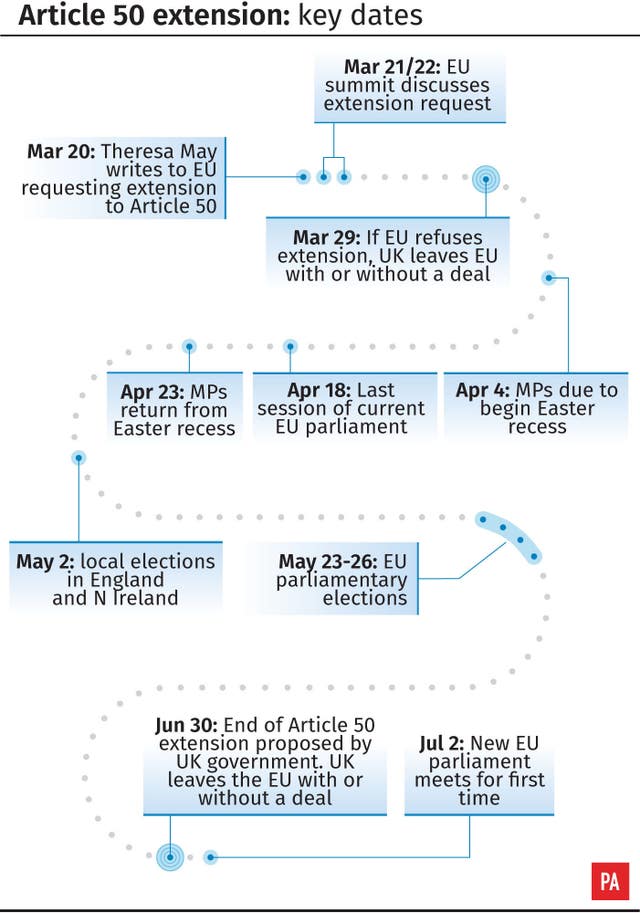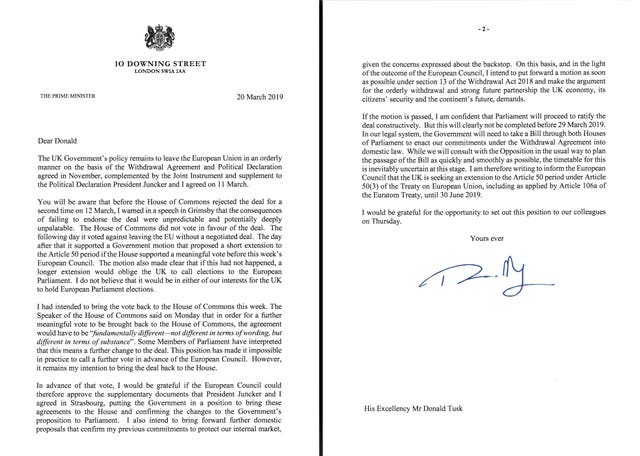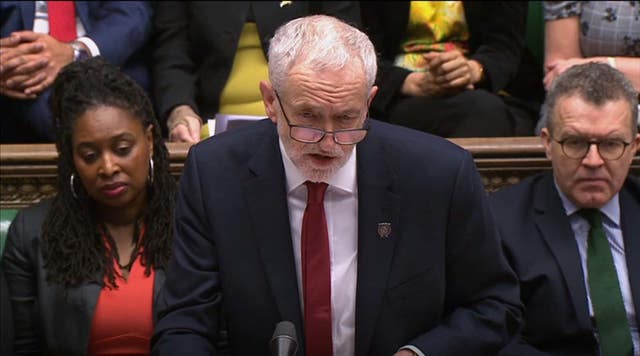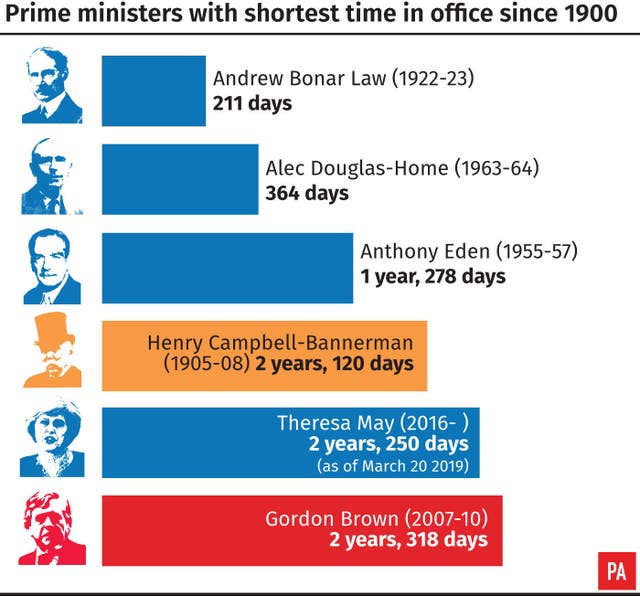Theresa May asks for Brexit delay and sparks speculation about her future as PM
She wants the UK’s exit from European Union postponed from March 29 to June 30.

Prime Minister Theresa May has requested a three-month delay to Brexit, postponing the UK’s departure from the European Union from March 29 to June 30.
The PM made the request in a letter to European Council president Donald Tusk exactly 1,000 days after the 2016 referendum which delivered a 52%-48% majority to quit the EU.
And she sparked speculation that she may step down if either MPs or Europe demand a longer extension to the Article 50 negotiation process, declaring: “As Prime Minister, I am not prepared to delay Brexit any further than June 30.”
If the delay is approved at a Brussels summit on Thursday, Mrs May will rush legislation through both Houses of Parliament next week to remove the date March 29 from Brexit laws.
And she told MPs she intends to table her Withdrawal Agreement for a third time in the Commons, in the hope of overturning massive defeats inflicted on it in January and March.
Aides declined to name a date for the third “meaningful vote” – known in Westminster as MV3 – but said it would happen “as soon as possible”.
European Commission president Jean-Claude Juncker warned the PM in a phone call shortly before her announcement that Brexit would have to be complete before May 23 or the UK would have to take part in elections to the European Parliament beginning that day.

Mrs May said involvement in the elections would be “unacceptable”, but appears to regard the July 1 date when new MEPs will take their seats as the effective deadline.
She told MPs at Prime Minister’s Questions: “The idea that three years after voting to leave the EU, the people of this country should be asked to elect a new set of MEPs is, I believe, unacceptable.
“It would be a failure to deliver on the referendum decision this House said it would deliver.”
Aides said Mrs May will “passionately” make her case for a three-month delay on Thursday to the leaders of the remaining 27 EU states, whose unanimous approval is required for any extension.
But an unconfirmed report in French news magazine Le Point suggested that President Emmanuel Macron will argue against any postponement beyond March 29.
And Mr Juncker said that there will “probably” have to be another summit next week to finalise the decision if Mrs May is unable to show on Thursday that she has the support of Parliament for her plans.
He told German radio that a short extension would give the UK Parliament time to agree to the existing Withdrawal Agreement text, but insisted there would be “no more negotiations”.
“If that doesn’t happen, and if Great Britain does not leave at the end of March, then we are, I am sorry to say, in the hands of God,” said Mr Juncker. “And I think even God sometimes reaches a limit to his patience.”
Only six days ago, Mrs May’s effective deputy David Lidington warned that a short delay would be “downright reckless”. And a motion tabled by the Government last week appeared to keep a longer extension of nine months to a year on the table.
But Leave-backing ministers are understood to have piled on pressure at Tuesday’s Cabinet meeting to keep any delay short.

Downing Street aides said the final form of Mrs May’s letter to Mr Tusk was not decided until Wednesday morning.
Asked if the decision had the backing of Cabinet, a Number 10 source would say only: “There was a long discussion on Brexit at Cabinet yesterday.”
In her letter to Mr Tusk, Mrs May said it remains the Government’s policy to take the UK out of the EU “in an orderly manner” on the basis of the Withdrawal Agreement and Political Declaration agreed in November and supplemented by documents agreed with Mr Juncker last week.
The agreement was rejected by 230 votes in January and 149 votes earlier this month.
Commons Speaker John Bercow said on Monday he would not allow the same motion to be brought again during this session of Parliament, unless it was substantially changed.
But Mrs May told the Commons: “The Government intends to bring forward proposals for a third meaningful vote.
“If that vote is passed, the extension will give the House time to consider the Withdrawal Agreement Bill. If not, the House will have to decide how to proceed.
“But as Prime Minister, I am not prepared to delay Brexit any further than June 30.”
Under EU rules, participation in the European Parliament elections must be confirmed by April 11, creating a hard deadline beyond which a longer extension would become impossible.
Labour leader Jeremy Corbyn accused Mrs May of “running down the clock” on Brexit.

He told the Commons: “This Government has led the country and themselves into crisis, chaos and division.
“We are still legally due to leave the European Union in nine days’ time. Months of running down the clock and a concerted campaign of blackmail, bullying and bribery has failed to convince the House or the country that her deal is anything but a damaging national failure and should be rejected.
“If the Prime Minister cannot get changes to her deal, will she give the people a chance to reject the deal and change the government?”
Tory Brexiteer Peter Bone warned Mrs May she will be “betraying” the public if she continues to seek to delay Brexit.

“If you continue to apply for an extension to Article 50 you will be betraying the British people. If you don’t, you will be honouring their instruction,” he told her during PMQs.
“Prime Minister, it is entirely down to you. History will judge you at this moment. Prime Minister, which is it to be?”
In her letter to Mr Tusk, Mrs May said Mr Bercow’s demand for a fundamental change to her motion had made it “impossible” to hold a third meaningful vote ahead of Thursday’s summit.
But she indicated she believes it is possible to satisfy the Speaker’s requirements by ensuring the European Council formally approves the documents agreed last week with Mr Juncker in Strasbourg.
She said she is also intending to bring forward domestic proposals to confirm previous commitments to protect the UK’s internal market, in response to concerns that the controversial backstop might drive a wedge between Northern Ireland and Britain.





